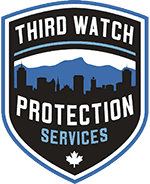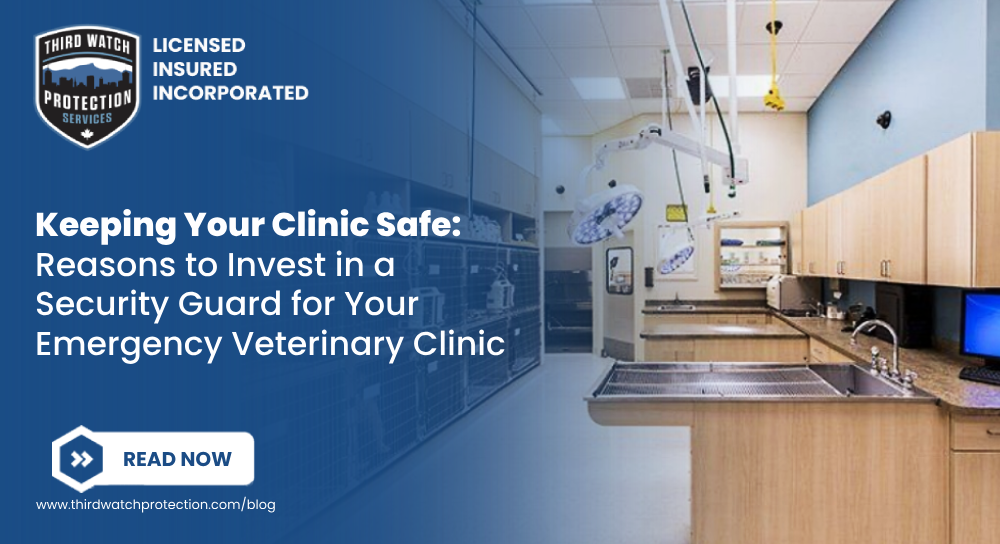Keeping Your Clinic Safe: Reasons to Invest in a Security Guard for Your Emergency Veterinary Clinic
In the fast-paced world of veterinary medicine, particularly in emergency clinics, animal care is paramount, but so is the safety of the facility, staff, and clients. As pet ownership continues to grow in Ontario, so does the need for emergency veterinary services. However, this surge in clientele also brings a variety of safety concerns, making it increasingly important to consider securing your facility. One of the most effective ways to ensure a safe environment is by investing in a professional security guard for your emergency veterinary clinic.
The Rising Need for Security in Veterinary Clinics
In recent years, emergency veterinary clinics have become hotspots for diverse situations, ranging from medical emergencies to emotional crises for pet owners. As a result, clinics must be prepared to handle both animal-related challenges and potential human conflicts. The presence of a security guard can significantly enhance safety protocols in multiple ways, including theft prevention, conflict resolution, and emergency response support.
1. Safeguarding Against Theft and Vandalism: One of the main reasons for hiring a security guard is to deter theft and vandalism. Emergency clinics often house expensive medical equipment, medications, and supplies. A security guard provides a visible deterrent to potential thieves who might target the clinic, especially during late-night hours when fewer staff members are present.
2. Managing Difficult Situations: Veterinary emergencies can be distressing for both pets and pet owners. Unfortunately, high emotions can lead to unpredictable behavior, including aggression or conflict among clients. A trained security guard is equipped to manage such situations, defusing potential conflicts before they escalate.
Having a professional on-site can offer reassurance to employees and clients alike. This assurance reduces anxiety, allowing staff to focus on providing the best care possible without being distracted by the potential for altercations or disruptive behavior.
3. Emergency Response and Crowd Control: In any emergency room setting, the potential for crowding exists. During crises, such as natural disasters or incidents requiring multiple emergency interventions, having a security guard can help control the flow of clients and pets.
Security personnel can assist in managing patient volume, ensuring that the clinic remains organized and that all patients receive the care they need promptly. Should a critical incident occur, experienced security guards can provide immediate support, facilitating communication with local authorities or emergency services.
4. Compliance with Legal and Insurance Requirements: Investing in security personnel can also help demonstrate a commitment to safety measures, which may be viewed favorably by regulatory bodies and insurance companies. Certain insurance policies may even offer discounts for clinics that engage professionally trained security personnel.
In a legal context, should an incident arise, having security on-site can provide valuable documentation through incident reports and surveillance footage. This documentation can be critical in protecting the clinic from potential lawsuits and liability claims.
5. Creating a Calm and Safe Environment: Animals are sensitive beings, and a chaotic environment can significantly impact their stress levels. Similarly, pet owners can feel frazzled and overwhelmed during emergency situations. The presence of a security guard can instill a sense of order and safety, helping to create a calm atmosphere conducive to healing.
This environment can improve not only the experience of pet owners but can also enhance job satisfaction for veterinary staff. Knowing that there is an individual in charge of security allows team members to feel safer and more focused on their responsibilities.
6. Monitoring and Surveillance: In addition to their physical presence, security guards can actively monitor surveillance systems. This capability can serve multiple functions, including recording daily activities within the clinic and notifying staff of any safety concerns or suspicious behavior.
Regular monitoring can help identify potential risks that may need addressing, such as malfunctioning equipment, outlet hazards, or unsafe conditions within the practice. Security guards can also assist with internal audits that keep safety procedures up to date with current standards.
7. Building Trust with Clients: The presence of a security guard can reassure clients and boost their confidence in your emergency veterinary clinic. When clients see an emphasis on safety and security, they are more likely to trust your facility with their beloved pets during a time of need.
This sense of trust is vital, especially in an emotionally charged environment like an emergency clinic, where clients are often anxious and desperate for help. Establishing rapport through tangible safety measures can go a long way in cultivating a loyal customer base.
8. Cost-Effectiveness of Prevention: While the initial investment in a security guard might seem steep, the long-term costs associated with theft, damages, or lawsuits can far exceed the price of hiring security. Investing in protective measures upfront can save considerable financial resources over time.
Moreover, by mitigating potential risks, your clinic can experience increased productivity, fewer distractions, and a calmer working environment. This increase in efficiency can contribute positively to overall clinic operations, presenting a tangible return on investment.
In Conclusion
In the busy landscape of emergency veterinary clinics in Ontario, ensuring the safety of staff, pets, and clients is of utmost importance. By investing in a security guard, you are taking proactive measures to protect your clinic’s valuable resources, create a secure atmosphere, and foster trust among your clientele.
An experienced security professional will not only act as a deterrent to potential threats but will also provide valuable support during emergencies. They can help create a structured environment that allows your staff to focus on delivering the best possible care to the animals that depend on them.
Ultimately, a secure clinic is a thriving clinic. By prioritizing safety, you not only enhance your clinic’s reputation but also contribute to a healthier environment for all who enter your doors. Making this investment is not merely a consideration; it’s an essential component of a successful emergency veterinary clinic in Ontario.
Have further questions regarding your security provider’s interview process?
Contact Third Watch Protection Services today for a convenient consultation regarding your security needs. Not only are we experts in our field, but we’re always happy to advise others on how best to receive the security coverage they need. Contact us by phone at 1-888-444-5232 or by email at mail@thirdwatchprotection.com



